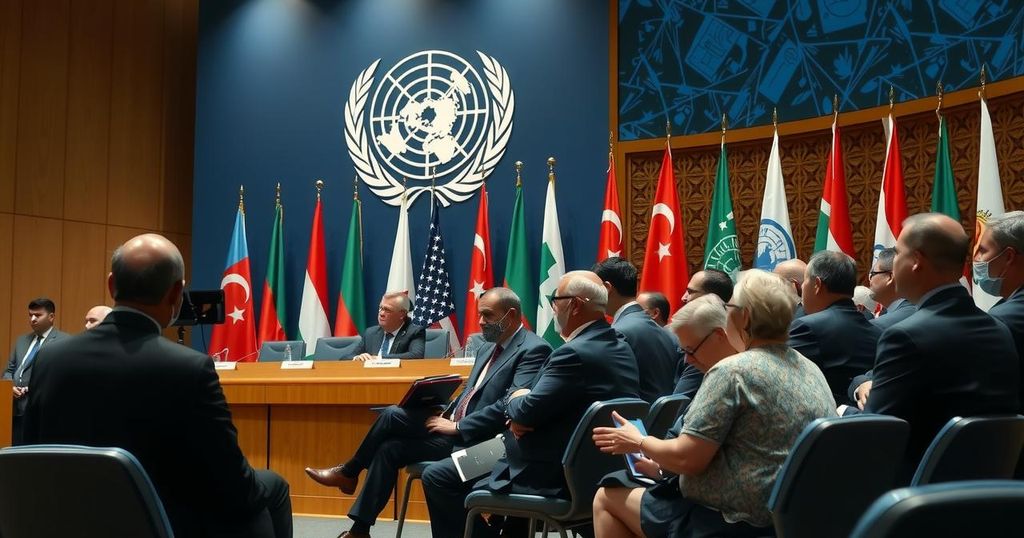Canadian Opposition Parties Boycott UN Climate Conference in Azerbaijan Over Human Rights Concerns

Most Canadian opposition parties will not attend COP29 in Azerbaijan due to human rights concerns following the mass exodus of Armenians from Nagorno-Karabakh. Green Party MP Mike Morrice highlights the ethical issues of hosting in a country known for its oil production and recent military actions. The NDP and Bloc Québécois have cited similar reasons for their absence, stressing the importance of integrity in international climate discussions. Environment Minister Steven Guilbeault’s attendance remains uncertain amidst these concerns.
Several opposition parties in Canada have opted not to attend the United Nations climate change conference, COP29, which will be hosted in Azerbaijan. The decision is largely motivated by serious human rights concerns stemming from Azerbaijan’s recent military actions against ethnic Armenians in Nagorno-Karabakh, resulting in the displacement of approximately 120,000 individuals. Kitchener-Centre MP Mike Morrice, representing the Green Party, noted that this marks the first instance in which all Green MPs will consciously refrain from attending due to the selection of Azerbaijan as the host nation. Morrice expressed skepticism regarding Azerbaijan’s suitability to host the conference, pointing out that it is a significant oil producer while simultaneously being embroiled in issues of ethnic cleansing. He advocated for limited Canadian representation at the conference, ideally restricting attendance to civil servants and excluding elected officials besides Environment Minister Steven Guilbeault. The New Democratic Party (NDP) and the Bloc Québécois also confirmed their absence, with the NDP specifically citing the human rights situation in Azerbaijan as a primary reason for not participating in COP29. Bloc Québécois climate critic Kristina Michaud expressed her discomfort regarding the circumstances in Azerbaijan and the lengthy travel involved, given her pregnancy. While she emphasized the importance of international participation in climate discussions, she articulated her inability to attend this year. Minister Guilbeault’s attendance is still under consideration; however, he has previously criticized Azerbaijan’s fossil fuel policies. Gaining insight from past events, a Canadian governmental body chose not to participate in an international conference due to similar human rights concerns. Overall, the situation reflects a broader dialogue surrounding ethics, human rights, and environmental policies within international forums. The Armenian National Committee of Canada has also been vocal, urging Canada to resist allowing its global platforms to be used by authoritarian regimes to enhance their image. Azerbaijan’s conduct raises questions regarding its ability to effectively lead global discussions on climate change and environmental sustainability. Despite this, Armenia, which has faced its own challenges, will take the lead in hosting COP17 next year, demonstrating a commitment to international environmental efforts amid political turbulence.
The article addresses the reluctance of Canadian opposition parties to participate in the UN climate change conference hosted by Azerbaijan due to significant concerns regarding human rights violations within the country. The backdrop of the conflict between Armenia and Azerbaijan over Nagorno-Karabakh underscores the gravity of the situation, especially in light of the recent forced displacement of ethnic Armenians. These events have influenced political discourse in Canada and raised questions over the ethical implications of holding global forums in countries with questionable human rights records.
In summary, the decision by Canadian opposition parties to boycott COP29 in Azerbaijan underscores the intersection of human rights and environmental diplomacy. With serious allegations of ethnic cleansing associated with the host nation, the political stance of these parties reflects a commitment to uphold ethical considerations in international relations. This decision has broader implications for future dialogues on climate change, especially in contexts where human rights records are contentious.
Original Source: www.cbc.ca








